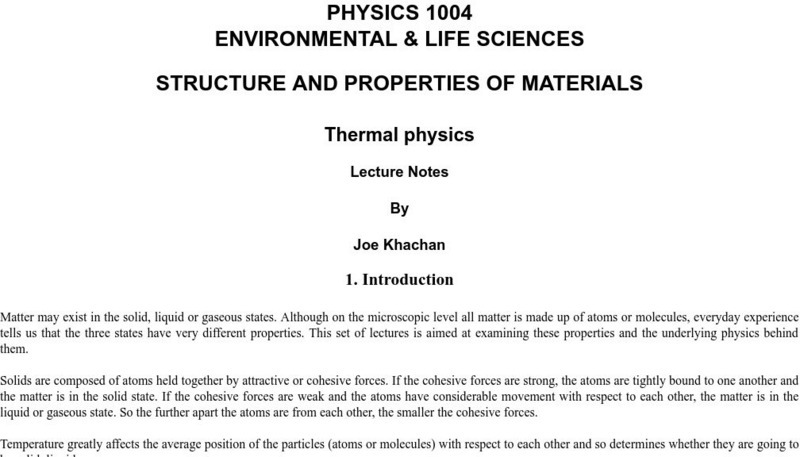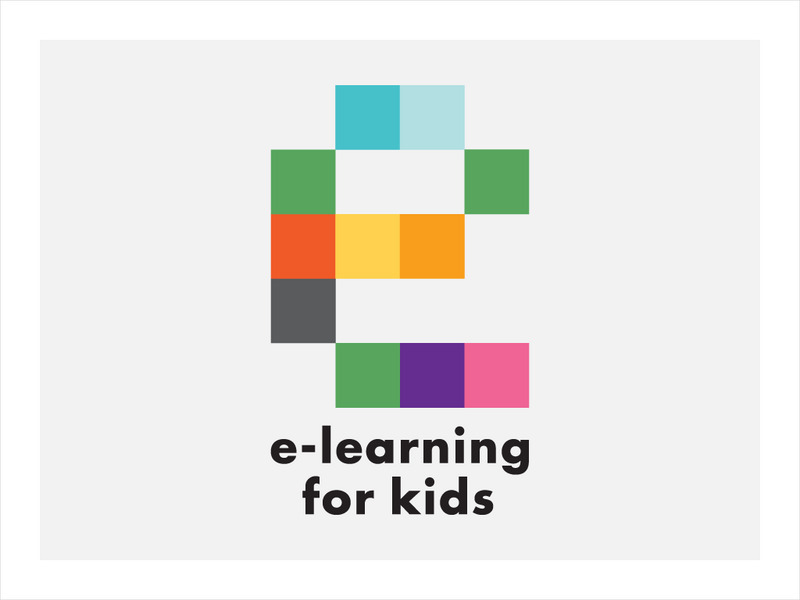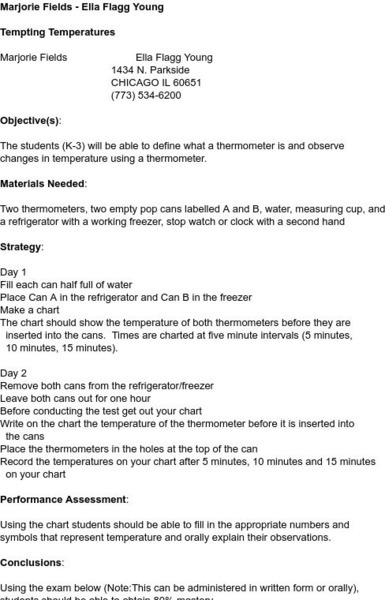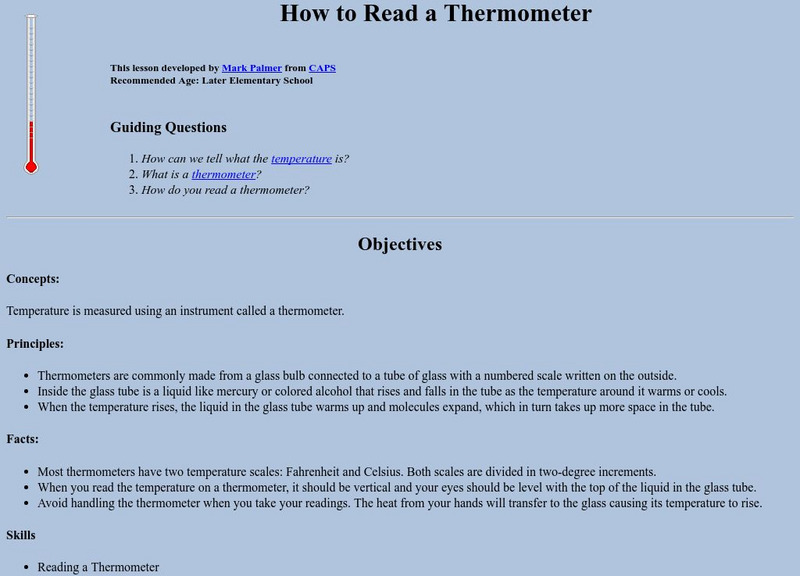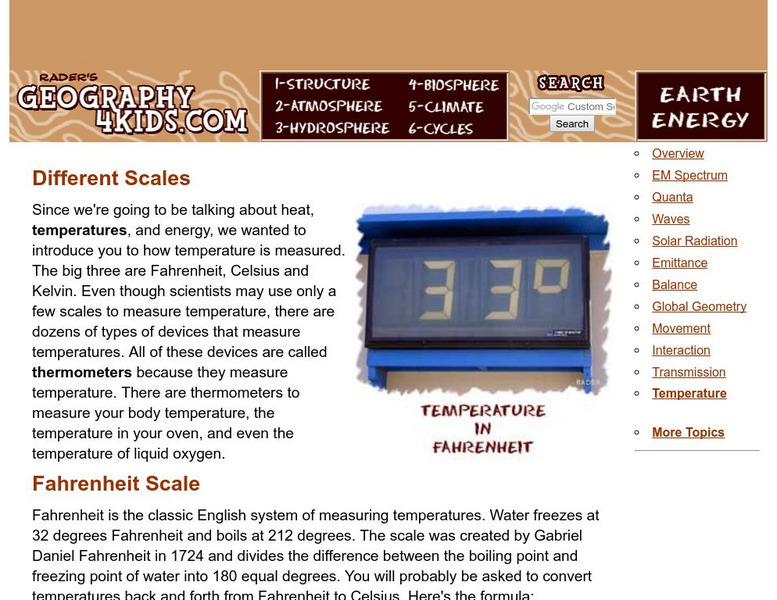Hi, what do you want to do?
Chem4kids
Chem4 Kids: Matter: Evaporation
An explanation about the process of evaporation and the conditions needed to complete this process.
University of Sydney (Australia)
University of Sydney: Structure and Properties of Materials/thermal Physics
An exhaustive set of "lecture notes" on various topics in thermal physics (including thermal expansion). Explanations are well done and more interesting than most. Includes both a mathematical and conceptual treatment of topics. Humor,...
American Geosciences Institute
American Geosciences Institute: Earth Science Week: Build Your Own Weather Station
Students are guided in how to build their own weather station that will measure temperature, humidity, precipitation, atmospheric pressure, and wind direction and speed.
Physics Aviary
Physics Aviary: Read the Thermometer Challenge
Checks your ability to read thermometers.
Science Struck
Science Struck: Types of Thermometers
Learn about the different types of thermometers, their applications, and how they work.
Science Struck
Science Struck: Who Invented the Thermometer?
Read about the history of the thermometer and the different types of thermometers and temperature scales that were invented.
The Franklin Institute
Franklin Institute Online: Keep Your Own Weather Journal
This site, which is provided for by the Franklin Institute Online, gives a format for keeping a weather journal.
Physics Classroom
The Physics Classroom: Thermal Physics: Temperature and Thermometers
Use this interactive tutorial to introduce students to the concepts of temperature and thermometers.
American Chemical Society
Middle School Chemistry: The Ups and Downs of Thermometers
See how thermometers measure temperature by the molecular movement of the liquid inside.
CK-12 Foundation
Ck 12: Earth Science: Collecting Weather Data
[Free Registration/Login may be required to access all resource tools.] Describes the various instruments that scientists use to measure weather conditions, including advanced tools like satellites and radar.
University of Illinois
University of Illinois Extension: Tree House Weather Kids: Seasons and Temperature: How Do We Measure Temperature?
Animated interactive teaches young researchers about scales and devices used to measure temperature.
Cuemath
Cuemath: Temperature
The article explains temperature. Specifically, you will learn about the temperature scale, temperature scale conversions, and the types of instruments used to measure temperature. Included are solved examples and interactive problems...
Science Buddies
Science Buddies: Measure Up With a Homemade Thermometer
In this activity, you will make a liquid thermometer to track how temperatures vary with location, indoors or outdoors.
E-learning for Kids
E Learning for Kids: Math: Market Place: Measurement: Temperatures
On this interactive site students learn to link temperature to everyday life and read informal scales on a thermometer.
University of Sydney (Australia)
Thermal Physics Module/temperature and Heat [Pdf]
A lengthy set of lecture notes on the distinction between heat and temperature. The science of thermography is introduced; the Kelvin temperature scale is explained and compared to the Celsius temperature scale. The meaning of a triple...
New York University
New York University: Measurement of Energy
Provides information about the distinction between heat and temperature, and allows you to check your understanding through exercises. The Kelvin, Fahrenheit, and Celsius temperatures are compared and discussed.
Science and Mathematics Initiative for Learning Enhancement (SMILE)
Smile: Aspects of Weather
A detailed weather lesson plan written for the primary, intermediate, and junior high level. Topics covered are weather symbols, thermometer, graphing temperature results, clouds, moisture and air pressure.
Science and Mathematics Initiative for Learning Enhancement (SMILE)
Smile: Tempting Temperatures
In this lesson plan students learn how to use a thermometer and compare changes in temperature using water in the fridge and water in the freezer. Helps students create charts to analyze data.
Michigan Reach Out
Michigan Reach Out!: How to Read a Thermometer
Basic lesson provided for by "Michigan Reach Out!" for students learning to read a thermometer.
PBS
Pbs Teachers: Make a Thermometer
Observe how a change in temperature affects the volume of water in a bottle.
NC State University
The Engineering Place: Making a Thermometer
A demonstration in how a thermometer works, followed by young scholars using real thermometers as they apply the scientific method.
Treehut
Suzy's World: How Does a Thermometer Work?
This site from Suzy's World and Suzy Cato explores what a thermometer is and how it works. Content includes some fun facts, an experiment, and a classroom activity.
Other
Mister teacher.com: Thermal Energy
An explanation, supported by pictures and animation, of how thermal energy transfers between objects.
Geography 4 kids
Geography4 kids.com: Different Scales
In three scales and several different types of thermometers scientists can study the temperature of all things.






